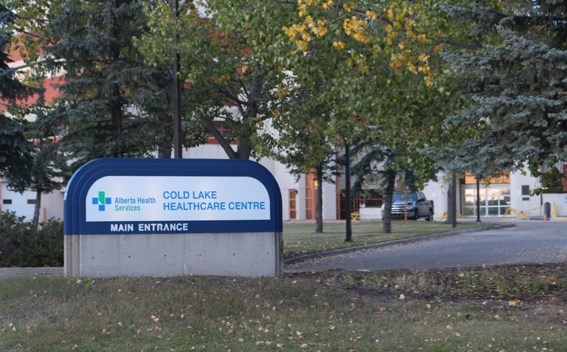Newborns and children at the Cold Lake Healthcare Centre are better connected with specialists, thanks to the installation of Telehealth units.
Cold Lake is one of eight central and northern rural Alberta nurseries that have started using Alberta Health Services' Telehealth videoconferencing. The system allows physicians and nurses to connect with neonatologists at the Stollery Children's Hospital to help care for acutely ill newborns.
“If a baby is born where we have a concern, any concern, then we can take the newborn into the nursery, turn on the Telehealth and connect with the neonatologist in the Neonatal Intensive Care Unit (NICU) in Edmonton. He or she can see the baby and we can discuss the baby with them right there. The physician can give us instructions on what we need to do, how we need to treat the babe, and whether or not the babe needs to go to Edmonton,” explained Catherine Garon, site manager for the Cold Lake Healthcare Centre.
Each of the chosen sites were provided with a portable Telehealth unit and had a data line installed in the labour and delivery department. The unit can be moved to the newborn's bedside to give Stollery doctors a better view of the baby.
In addition to Cold Lake, Camrose, Fort Vermilion, Hinton, Lloydminster, St. Albert, Wetaskiwin, and High Level are now connected via the Telehealth system to the Stollery's NICU. The hospitals that were chosen don't have access to a local pediatrician.
“Previously, we used the telephone to consult with physicians about critically-ill newborns,” said Dr. Ernest Phillipos, zone section chief of newborn health for the Northern Alberta Neonatal Program at the Stollery. “Thanks to immediate videoconferencing, we now have enhanced our ability to triage referrals, reduce the need for unnecessary transfers, or provide interim support to rural physicians and nursing staff until our NICU transport team arrives.”
The Cold Lake hospital had their neonatal Telehealth unit installed approximately three months ago. Since then, Garon noted they have already had to use the unit a couple of times with newborns and it's been beneficial to both the patient and doctors.
“It's excellent. It's quick, instant, the neonatologists are right there and we always feel reassured. It's nice to have.”
The videoconferencing was first implemented in High Level in May 2014, to pilot the project before expanding it to other rural hospitals.
Phillipos added that the system helps to reduce stress on the parents, as transporting newborns to the city often distances families from their support networks and causes additional strain.
“Since implementing consults via Telehealth, we've had many cases where the neonatologist on call has been able to provide support to the rural physician and nursing staff to manage the newborn at their location, preventing unnecessary transport of some newborns and their family. Of those babies still requiring transport, with videoconferencing, newborns are much more stable when they arrive to our critical care sites.”
In addition to getting connected with the NICU, the Cold Lake Healthcare Centre also received a pediatric Telehealth unit allowing them to connect with the Pediatric Intensive Care Unit (PICU) in Edmonton. Previously, they had another unit installed for videoconferencing with a neurologist.
“(Telehealth units) are the new wave, that's the new way to be able to do it,” said Garon. “It's one thing to phone a doctor but another thing entirely when a doctor can speak face-to-face with a physician on the other end and see his or her concerns, see the baby. It's just a better way of doing things.”
According to Garon, the next area that could possibly be looking at getting Telehealth units is psychiatry, however, there hasn't been any formal mention of it yet.



